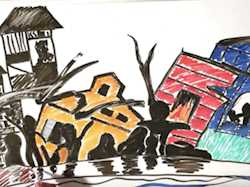Why I Became Involved in the Human Trafficking Fight: The Business Role in Human Trafficking
October 16, 2014
John Pepper
Opinion
�
Business
When I first reached the decision to support the creation of the National Underground Railroad Freedom Center almost 20 years ago, I believed that the story of the Underground Railroad and the abolition of slavery needed to be recalled in their own right, just as the Holocaust is. I also believed that this history carried a message of great relevance to the world as I was experiencing it then—particularly to the continued violation of the dignity and freedom of individuals as I witnessed it in the genocide occurring in Bosnia and Herzegovina. I felt then and I feel now that the supreme values of courage, cooperation and perseverance inspiring the freedom heroes of the past would inspire us to take steps for freedom in our lives today.
It was about six years ago that I first came to appreciate the horror of contemporary slavery and human trafficking as it continues to affect the lives of over 27 million men, women and children who are trapped in various forms of slavery and sexual servitude around the world.
I also came to realize that businesses and business leaders had a major role to play in eradicating this scourge. And not for the first time. It is important to remember that business was complicit in the institution of chattel slavery through the sale, trading and production of cotton goods over more than two centuries. Of course, at that time, slavery was a legalized institution. No longer. But slavery in its essential character of denying freedom and subjecting individuals to inhumane treatment remains.
What Businesses can do Today
Businesses today are starting to play an important role in eradicating this scourge. They are doing this in several ways:
1. Businesses are helping spread awareness of the reality of contemporary slavery and human trafficking and the possibility and the means of eradicating it. For example, CNN supports a major Freedom Project which brings real-life stories of contemporary slavery to the public around the world. Other news media have provided their own treatment of this issue. Eradication of modern-day slavery has to start with awareness. And that awareness is building.I would note that the website on which you are reading this blog, “End Slavery Now,” is partnering with CNN and other NGOs. We take our responsibility to be a key source of building awareness of this continuing tragedy very seriously.
2. Businesses can and must alert their employees to the signal indicators that a person may be entrapped in slavery.
3. Most importantly, business can and must ensure that their own supply chains are, to the best of their ability, not contaminated with enslaved labor. This is a challenging job, as many businesses now have many levels of suppliers in countries throughout the world. Despite the complexity, the creation and enforcement of strict codes of conduct for principal and sub-suppliers is increasingly being carried out. Progress must continue. Business has no greater responsibility than to take those actions within its control to ensure what every individual on this planet deserves—Freedom.
Doing Everything to Ensure People are Free
I am encouraged that businesses are increasingly facing up to this responsibility. One organization, gBCAT, has enrolled about a dozen companies, including Delta Airlines, Ford, Microsoft, Coca-Cola and Hilton. They are committed to the following Mission: “To mobilize the power, resources and thought leadership of the business community in an effort to end human trafficking, including all forms of forced labor and sex trafficking.”
We must not forget that there are more people enslaved today than when chattel slavery was outlawed in the United States. Eradicating this scourge will require the coordinated and committed effort of every element of society, including business. We are making progress. Yet, we have miles to go. The lives of millions of people depend on our doing it.
As a former CEO of Procter & Gamble, John Smale, said many years ago: “It isn’t enough to stay in business and be profitable. We believe we have a responsibility to society to use our resources—money, people and energies—for the long-term benefit of society, as well as the Company.”
I can imagine no more important effort in “benefitting society” than doing everything in our power to ensure that people are free.
John E. Pepper
Topics:
Business












